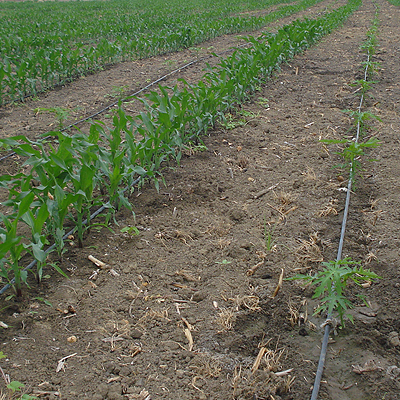Recent projects with research impact
Water Resources East
Cranfield Water Institute (CWSI) is involved in a £5m flagship WRE project (funded by Anglian Water) to develop a long-term, multi-sector integrated water resource strategy for the East Anglian region, recognising demands for public water supply (PWS), industry, power generation, agriculture and the environment. Working with the University of Manchester and industry contractors (Atkins, Motts), CWSI staff are responsible for development of the future water demands for agriculture, evaluating the demand ‘trade-offs’ between sectors, options for new resource infrastructure in the region to support collaborative water management and supporting wider agricultural stakeholder engagement.
Increasing resilience to water-related risks in the UK fresh fruit and vegetable (FF&V) system
CWSI is involved in one of five projects, which are part of a £9m investment aimed at optimising UK food supply and improving global food security. A cross-institutional effort involving collaboration from staff at the University of Oxford, the University of East Anglia and NIAB EMR, this project seeks to identify and explore hot spots of water-related risk in the UK’s FF&V system by combining trade, production and hydrological data and integrating this with stakeholder perspectives to develop system maps and shared visions of how to move the system in a more resilient direction.
Ready for change with CLIMSAVE
Working with EU partners, CWSI has developed a platform from which sectors can self-analyse how climate change might impact them, along with their vulnerabilities and adaptation options. The CLIMSAVE (Climate Change Integrated Assessment Methodology for Cross-Sectoral Adaptation and Vulnerability in Europe) project has produced a user friendly, interactive web-based tool for sectors including agriculture, forestry, biodiversity, coastal, water resources and urban development. It provides decision makers with access to reliable science-based information to help them respond to the cross-sectoral risks of climate change impacts and assess opportunities for adaptation.
Nexus thinking for sustainable agricultural development in Andean countries (NEXT-AG)
Food security is consistently seen as one of the key global challenges for the coming decades. NEXT-AG aims to provide policymakers in Andean countries with the needed evidence base that allows them to develop new coordinated policies and programmes for increasing resilience and promoting sustainable economic growth in the context of increasing national and global food demand.
Recent relevant publications
Daccache A., Ciurana J.S., Rodriruez Diaz J.A. and Knox J.W (2015) Water and energy footprint of irrigated agriculture in the Mediterranean region Environmental Research Letters 9 (2014) 124014.
Perez-Ortola, M., Daccache, A., Hess, T.M., Knox, J.W (2014) Simulating impacts of irrigation heterogeneity on onion (Allium cepa L.) yield in a humid climate. Irrigation Science DOI 10.1007/s00271-014-0444-2.
Monaghan J, Daccache A, Vickers L, Hess T, Weatherhead EK, Grove I & Knox JW. (2013) More ‘crop per drop’: constraints and opportunities for precision irrigation in European agriculture. Journal of the Science of Food and Agriculture, 93 (5): 977-980.
Harrison PA, Holman IP, Cojocaru G, Kok K, Kontogianni A, Metzger MJ, Gramberger M. (2013) Combining qualitative and quantitative understanding for exploring cross-sectoral climate change impacts, adaptation and vulnerability in Europe. Regional Environmental Change 13(4): 761-780.

I joined Cranfield University because this research project gives me the opportunity to explore an area I am interested in: agriculture in extreme environments, irrigation water management and agriculture sustainability.
Alban Echchlh, Current PhD student


